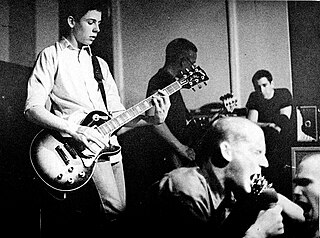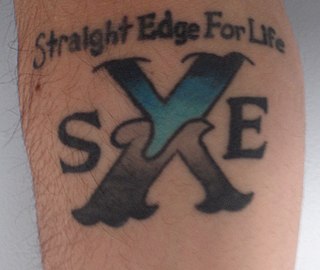
The punk subculture includes a diverse and widely known array of ideologies, fashion, and other forms of expression, visual art, dance, literature and film. Largely characterised by anti-establishment views, the promotion of individual freedom, and the DIY ethics, the culture originated from punk rock.

Hardcore punk is a punk rock music genre and subculture that originated in the late 1970s. It is generally faster, harder, and more aggressive than other forms of punk rock. Its roots can be traced to earlier punk scenes in San Francisco and Southern California which arose as a reaction against the still predominant hippie cultural climate of the time. It was also inspired by Washington D.C. and New York punk rock and early proto-punk. Hardcore punk generally disavows commercialism, the established music industry and "anything similar to the characteristics of mainstream rock" and often addresses social and political topics with "confrontational, politically-charged lyrics."
Anarcho-punk is ideological subgenre of punk rock that promotes anarchism. Some use the term broadly to refer to any punk music with anarchist lyrical content, which may figure in crust punk, hardcore punk, folk punk, and other styles.

Hardline is a deep ecology subculture that has its roots in the vegan straight edge hardcore punk scene. It is commonly seen as a more extreme version of straight edge. From its outset, Hardline adherents put out statements and literature pushing a biocentric view of the world, which advocated for militant veganism, animal rights, anti-abortion, anti-homosexuality, and a much more militant version of the straight edge lifestyle, which advocates for a no alcohol, no drugs, no tobacco lifestyle. The Hardline worldview has been described variously as ecoauthoritarian and ecofascist in nature. Nonetheless, Hardline co-founder Sean Muttaqi adamantly rejected racism even while sending mixed signals about fascism.

Earth Crisis is an American hardcore punk band from Syracuse, New York, active from 1989 until 2001, reuniting in 2007. Since 1993 the band's longest serving members are vocalist Karl Buechner, lead guitarist Scott Crouse, bassist Ian Edwards and drummer Dennis Merrick. Their third and current rhythm guitarist Erick Edwards joined the band in 1998.
Karl Buechner is an American musician from Syracuse, New York, best known as the frontman for the hardcore band Earth Crisis. He is also the singer of Freya, Path of Resistance, Vehement Serenade, Apocalypse Tribe and 1000 Drops of Venom.

Crust punk is a form of music influenced by English punk rock and extreme metal. The style, which evolved in the early 1980s in England, often has songs with dark and pessimistic lyrics that linger on political and social ills. The term "crust" was coined by Hellbastard on their 1986 Ripper Crust demo.
Metalcore is a fusion music genre that combines elements of extreme metal and hardcore punk. As with other styles blending metal and hardcore, such as crust punk and grindcore, metalcore is noted for its use of breakdowns, slow, intense passages conducive to moshing. Other defining instrumental qualities include heavy riffs and stop-start rhythm guitar playing, occasional blast beats, and double bass drumming. Vocalists in the genre typically use thrash or scream vocals. Some later metalcore bands combine this with clean singing, often during the chorus. Death growls and gang vocals are common. 1990s metalcore bands were inspired by hardcore while later metalcore bands were inspired by melodic death metal bands like At the Gates and In Flames.
Youth crew is a music subculture of hardcore punk, which was particularly prominent during the New York hardcore scene of the late 1980s. Youth crew is distinguished from other punk styles by its optimism and moralistic outlook. The original youth crew bands and fans were predominantly straight edge and vegetarian or vegan.

Punk ideologies are a group of varied social and political beliefs associated with the punk subculture and punk rock. It is primarily concerned with concepts such as mutual aid, against selling out, egalitarianism, humanitarianism, anti-authoritarianism, anti-consumerism, anti-corporatism, anti-war, decolonization, anti-conservatism, anti-globalization, anti-gentrification, anti-racism, anti-sexism, gender equality, racial equality, health rights, civil rights, animal rights, disability rights, free-thought and non-conformity. One of its main tenets is a rejection of mainstream, corporate mass culture and its values. It continues to evolve its ideology as the movement spreads throughout North America from its origins in England and New York and embraces a range of anti-racist and anti-sexist belief systems. Punk does not necessarily lend itself to any particular political ideology as it is primarily anti-establishment and though leftist punk is more common due to the prevalence of liberal and conservative ideologies in the status-quo.

New York hardcore is both the hardcore punk music created in New York City and the subculture and lifestyle associated with that music. New York hardcore grew out of the hardcore scene established in Washington, D.C., by bands such as Bad Brains and Minor Threat. Initially a local phenomenon of the 1980s and 1990s, New York hardcore eventually grew to establish an international reputation with little to moderate mainstream popularity but with a dedicated and enthusiastic underground following, primarily in Europe and the United States. With a history spanning over more than four decades, many of the early New York hardcore bands are still in activity to this day. Some of them have been continuously or almost continuously active since their formation as well as having reunion shows.
Latino punk is punk music created by Latino people in Latin America and the United States. The angst and protest qualities of punk music and style have had a strong appeal to Latino youth in the U.S., and to the people in Latin America. It is impossible to pinpoint the exact location or moment when Latinos began engaging in the punk subculture. However, Latin American rock began showing aspects of punk music during the mid-1960s with the Peruvian band Los Saicos; this band reflected many aspects of other proto-punk bands such as the Yardbirds. The Saicos were predecessors to some of the most influential proto-punk bands in the U.S., such as New York Dolls, MC5, and The Stooges
"Straight Edge" is a track from Minor Threat's 1981 eponymous debut 7" EP, later reissued both as part of the 1984 collection Minor Threat, then as part of 1989's Complete Discography. The song was the inspiration for a movement in the punk subculture known as straight edge.

Straight edge is a subculture of hardcore punk whose adherents refrain from using alcohol, tobacco, and other recreational drugs, in reaction to the excesses of punk subculture. For some, this extends to refraining from engaging in promiscuous sex, to following a vegetarian or vegan diet, and to not using caffeine or prescription drugs. The term straight edge was adopted from the 1981 song "Straight Edge" by the hardcore punk band Minor Threat.

The scene subculture is a youth subculture that emerged during the early 2000s in the United States from the pre-existing emo subculture. The subculture became popular with adolescents from the mid-2000s to early 2010s. Members of the scene subculture are referred to as scene kids, trendies, or scenesters. Scene fashion consists of skinny jeans, bright colored clothing, a signature hairstyle consisting of straight, flat hair with long fringes covering their forehead, and bright colored hair dye. Music genres associated with the scene subculture include metalcore, crunkcore, deathcore, electronic music, and pop punk.
Bent edge or curved edge was a hardcore punk subculture that was formed as counter-movement to the straight edge movement. It was started by members of Washington, DC hardcore scene who were fed up with the rigidness and intolerance in the nascent straight edge scene. To combat straight edge, they started throwing beer and drug-fuelled punk shows. The point of these shows was to be the complete antithesis of straight edge.
Krishnacore is a subgenre of hardcore punk which draws inspiration from the Hare Krishna tradition. Although some hardcore punk bands had already made references to Krishna Consciousness in the 1980s, the subgenre was established in the early 1990s by the bands Shelter and 108. The name is a portmanteau of "Krishna" and "hardcore".
Animal rights are closely associated with two ideologies of the punk subculture: anarcho-punk and straight edge. This association dates back to the 1980s and has been expressed in areas that include song lyrics, benefit concerts for animal rights organisations, and militant actions of activists influenced by punk music. Among the latter, Rod Coronado, Peter Daniel Young and members of SHAC are notable. This issue spread into various punk rock and hardcore subgenres, e.g. crust punk, metalcore and grindcore, eventually becoming a distinctive feature of punk culture.

Firestorm is the second EP by American metalcore band Earth Crisis. It was released in 1993 and marked the band's first release through Victory Records. Firestorm has been described as a landmark release in hardcore punk for its metal influences and political, militant lyrics, along with helping "pioneer what would become both a signature sound for the band, as well as metalcore as a whole – right alongside the likes of Integrity." The title track is considered Earth Crisis' best-known song.









